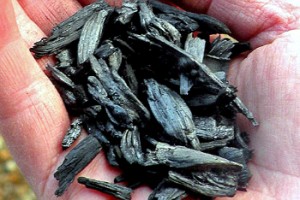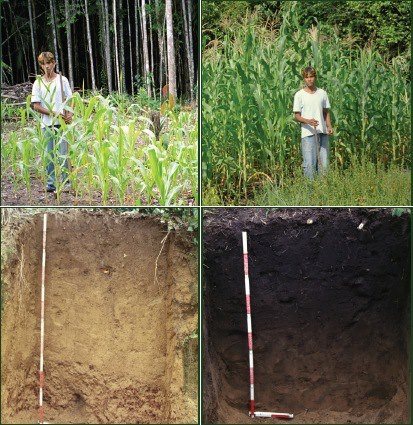Biochar Significantly Increases Plant Health and Restores Environment

The future of agriculture is to produce the highest quality, most health-giving foods possible, and in a way that benefits both the earth and its people. Through the practice of modern agriculture – and its use of chemical fertilizers, pesticides, as well as the production of annual grains as staple foods – we have turned much of our once-fertile lands into desert, and now need ways to restore the soil and surrounding ecosystems.
Adding biochar to your soil is one powerful way to restore and enhance soil health and make the transition to regenerative agriculture.
What is Biochar?
Biochar is another name for charcoal, produced by slowly heating biomass (wood and other plant materials) in a low-oxygen environment. One way to simulate a low oxygen environment for the production of biochar is called a kiln.
Here’s how it works: when you heat wood, the gases contained inside the wood seep out. And once all the gases have escaped the wood, what you’re left with is pure carbon, also known as biochar.
For use in gardens and for farming applications, biochar is then crushed into small bits, and usually combined in a drum or bin with nutrients, such as fish emulsion, seaweed, molasses, and mixed into soil at a depth of 4 to 6 inches.
TABLE OF CONTENTS
7 Benefits of Adding Charcoal to Soil
There are many benefits of adding biochar to your soil. Here is a list of 7 of those benefits:
- Return depleted carbon to the soil
- Raise soil’s water retention ability
- Reserve nutrients for plants when they need them
- Filter toxic chemicals from the soil
- Increase diversity and quantity of essential soil microorganisms
- Improve overall soil quality
- Increase speed of growth and yields
When introduced into soil, biochar can stabilize the carbon in the soil, in the form of charcoal, for hundreds or even thousands of years. It serves as a type of ‘coral reef’ of the land, where it’s porous and massive surface area provides a great benefit to soil microorganisms.
“It is estimated that one gram of charcoal has about 9000 square feet of surface area in it. That’s almost two football fields of surface area on a little piece about the size of a pencil eraser.”
– Wae Nelson
The introduction of biochar into soil is not like applying fertilizer; it is the beginning of a process. Most of the benefit is achieved through microbes and fungi. They colonize its massive surface area and integrate into the char and the surrounding soil, dramatically increasing the soil’s ability to nurture plant growth.
Biochar: Before and After
Here is a before and after photo of both the soil and the crop yields following biochar application to the soil.

A before (left) and after (right) in a field with biochar.
As you can see both the richness of the soil and the quality of the plants growing in it are increased through the addition of biochar.
How to Make Biochar
Biochar can be purchased from your local garden center or online, but the most economical way to obtain it is to make it yourself. There are many different ways you can make biochar, including using a kiln, or a discarded oil drum.
Below is a video showing you a simple way to produce biochar in your own backyard.
Once you’ve produced your biochar, crush it into small bits using a tamp or sledgehammer inside a drum or bin. Next, add some water and fertilizer to saturate the charocal with nutrients before applying it to soil. Some nutrients you can add include:
- Compost
- Fish emulsion
- Liquid seaweed fertilizer
- Molasses
- Water
Mix the slurry thoroughly until it’s moist but has a similar texture to soil. If it’s ‘soupy’ add some more compost or straw to soak up the excess water. Once complete, mix into your soil, ideally 4-6″ deep at the root zone.
Conclusion
When people think of a farmer, they tend to think food producer. But more accurately, regenerative farmers are stewards of the soil. The soil is the foundation of all food produced, whether that food be animal foods or plant foods. Soil comes first, and food comes second.
With that in mind, adding biochar to your soil is one powerful way to improve the health of your soil, and be a better steward of the land you inhabit. The pure carbon contained within charcoal effectively improves the water retention of soil, filters chemicals from the soil, retains nutrients for plants, and increases soil microorganisms, overall increasing the health of all plant life grown in that soil.
Whether you buy it, or make it yourself, biochar is one of the best things you can to today to create abundance and soil health for generations to come.
References
- https://www.motherearthnews.com/organic-gardening/making-biochar-improve-soil-zmaz09fmzraw.aspx
- https://articles.mercola.com/sites/articles/archive/2013/10/12/biochar-production.aspx
